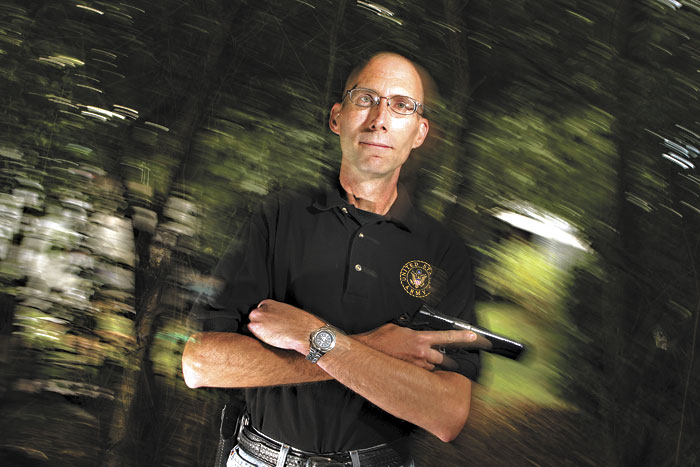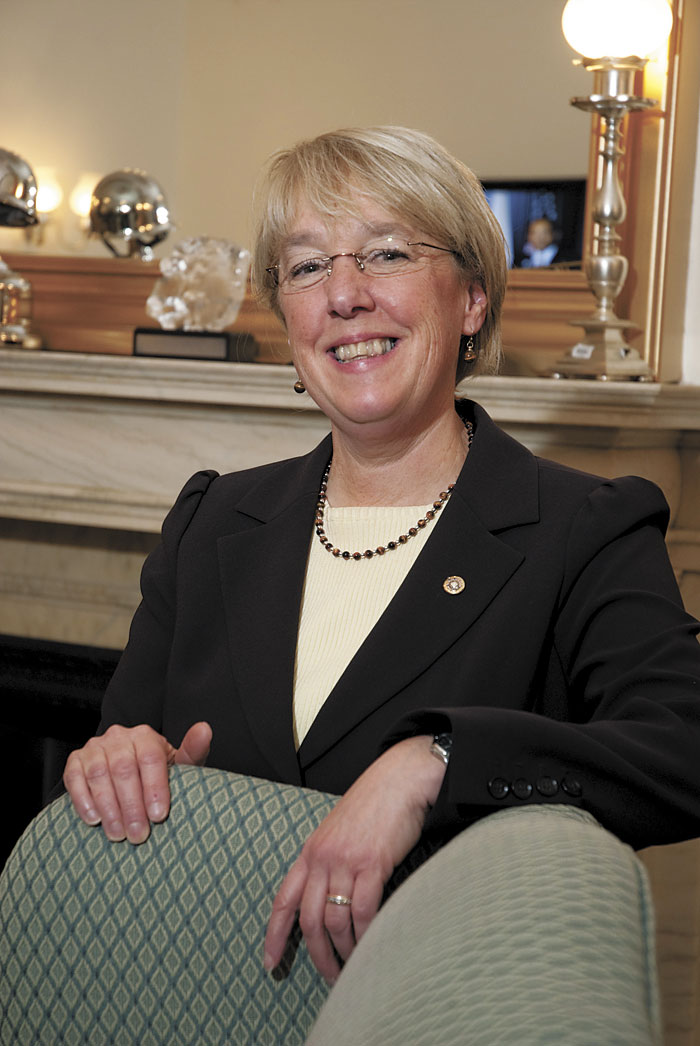In some ways, the group of Beacon Hill residents who gathered August 27 to walk the streets at dusk was just like any other community meet-up: People made small talk about the weather and compared how long they’d lived in the neighborhood. But in another way, it wasn’t so typical, at least for Seattle: Some of those assembled were packing heat, part of an armed patrol recently born of the neighborhood’s listserv (beaconhill.seattle.wa.us).
Their 90-minute walk started on Beacon Avenue South and meandered north along the residential streets of the neighborhood’s western slope. The idea was to walk to 15th Avenue South and South Massachusetts Street, an area discussed at length online as a hotbed of drugs and prostitution. Along the way, talk turned from the importance of “situational awareness” to the rising cost of ammunition and preferred places for target practice.
“This is the area that makes the hair on the back of my neck stand up,” said Ezra Klug, a native of Chicago, as the group neared its destination. But all was quiet—the most action they saw was a couple of suspicious characters sitting on a stoop.
Klug recently became a concealed-weapons permit holder after confronting some teenagers who were fighting near his house on 17th Avenue South earlier this year. Klug says the teenagers threatened him with a gun after he asked them to go home.
Tonight, Klug is armed only with a camera and a cell phone, because he doesn’t feel he’s had the proper training to carry his new gun. “Don’t look to me for backup,” Klug says to the group’s leader, Mike Cheney.
“We’re not looking for trouble; we just want to see what’s happening,” says Cheney, a longtime Beacon Hill resident and former Fort Lewis military police officer. Tall, slight, and intense, with a shaved head and small, circular glasses, Cheney, whose wife Ann also carried a gun on the walk, says carrying a concealed weapon “is like buying insurance or wearing a seatbelt. It’s something you do to be prepared.”
The patrols are an offshoot of Cheney’s new group, Citizens for the Second Amendment, which had its first meeting last month. “It doesn’t mean you’re a gun fanatic or a freak just because you have a concealed-weapons permit,” he explains one morning at Galaxie, a popular Beacon Hill coffee shop.
Cheney, who always carries a piece, today has his Kimber Gold Combat II 1911 .45-caliber harnessed in a shoulder strap under his black jacket. He keeps his concealed-weapons permit in a window in his tri-fold wallet, along with his “Blackwater Alumni” membership card. Though he never worked for the infamous Defense Department contractor, membership allows him perks like access to Blackwater’s online store and firearms training. (According to the company Web site, Blackwater is currently conducting a membership push for its alumni association, “one of the most important and far-reaching tools used to keep the Blackwater family connected and informed.” Cheney says he wanted to be part of the group because he’s known people who have worked for Blackwater. “They are not just a bunch of hired killers,” he says. “They are of the highest caliber of individuals.”)
Cheney says he shoots regularly at local firing ranges—”I go through 500 rounds every time I go,” he says—because criminals practice too. He hopes his Second Amendment group, the only one of its kind in Seattle, will help educate people about gun ownership. But the emergence of the armed patrols has sparked a spirited discussion on Beacon Hill about whether people should have to disclose whether or not they’re packing heat during the evening walks. It’s also challenged people’s assumptions about who among them carries a gun.
“The gun in [your neighbor’s] handbag has always been there when they walked to the store, to yoga class, at Java Love, Galaxie, the library, or church, or maybe even when they chaperoned the…kids on their way to school,” wrote George Robertson on the neighborhood listserv. “You just didn’t know it.”
But Roberta Carlson isn’t buying it. “I don’t think people going to my [yoga] class have guns,” she tells Seattle Weekly. “I’m not in favor of a neighborhood vigilante group. The thought of people walking around with guns, no matter what their intentions are, is a little scary.”
For its part, the Seattle Police Department is mum on the subject. “We are here to uphold the law,” says Officer Jeff Kappel, a department spokesperson. “As long as people are exercising their rights lawfully, we have no issue or opinion.”
Shelly Bates, a Beacon Hill resident and mother of three, feels that if she went on one of the patrols, she’s not sure she’d ask who’s carrying a gun—in large part because she doesn’t want to know.
“I’m not sure I’d be ready to deal with [people carrying guns on the walk],” she says, adding that while she realizes she probably should ask the parents of her kids’ playdates if they have guns at home, she doesn’t do that either. “They don’t appear like gun owners to me, but you ask a question like that and people you never thought might be. It could change your whole perspective of what you think of them. I’m not sure I could deal with that information.”
According to the state Department of Licensing, 47,478 King County residents carry concealed-weapons permits. (237,874 have them statewide. Figures are tough to track by city, as Seattle residents can either go through the Seattle Police Department or the King County Sheriff’s Office to get their permit.) The number of people renewing or obtaining new permits statewide since 2001 has ranged from a low of 35,511 in 2004 to a high of 69,568 last year.
Washington is one of the easier places in the country to get a concealed-weapons permit: You must be 21 years old; have no outstanding warrants, felony convictions, or mental-health conditions; be willing to be fingerprinted; and submit to a criminal-history background check. Unlike Oregon, which requires demonstrated competence with a handgun, or Nevada, which mandates applicants take a sheriff-approved skills course, there’s no training requirement whatsoever.
Kristen Comer, executive director of Washington CeaseFire, says there are more licensed firearms dealers in Washington “than there are Starbucks stores,” and that people should work together to guard against tragedies that arise when guns land in the wrong hands.
To that end, Washington CeaseFire supports the efforts of responsible gun owners to meet, train, and educate one another. But Comer tempers that by saying the Beacon Hill group should consider the opinions of neighborhood members when it comes to the patrols.
“Armed patrols are different from an individual neighbor carrying his or her firearm in the course of his or her daily activities,” she says. “They imply a greater degree of intentional surveillance.”
Given the reaction online, Cheney was surprised his group wasn’t met with protesters at its inaugural meeting, held just south of Boeing Field at Randy’s restaurant on Aug. 9.
“It’s not just that I’m against guns, but the fact that they chose here rather than, say, Magnolia for their meetings,” wrote one anonymous poster at blogginggeorgetown.com on Aug. 3. “The underlying message I’m hearing is that the community condones the sort of violent activity that is associated with gun ownership.”
Cheney says he went to that first meeting “armed” with information to dispense to his critics, none of whom showed. “Their loss,” he chides, adding that he’d like to hold future gatherings in places like Queen Anne and Capitol Hill (the group’s next meeting is in Bellevue on Sept. 20). He also plans to invite the City Council to his meetings, and to lobby against Mayor Nickels’ gun ban on all city-owned property.
While Cheney’s made some people squeamish with his endeavor, he seems to have succeeded in finding some converts—particularly those fed up with what they say is a police department that’s been slow to respond to threats in the neighborhood.
When asked about police response on Beacon Hill, Officer Kappel points to 2007 numbers that show crime citywide at a 40-year low. Still, he says the department encourages citizens to be vigilant: “We can’t do it alone. Our system isn’t set up to do it alone. We need community involvement.”
However, though city statistics don’t show Beacon Hill as having much more crime than other neighborhoods, residents feel the neighborhood is plagued by burglaries, drug use, and gang-related activity.
“Crime up here is increasing; there’s definitely more gunfire in the neighborhood,” says Rony Wiesel, whose home and car have both been broken into over the past couple of years. “For the longest time I was thinking anyone who carried a weapon is insane. Now I’m not certain.”






